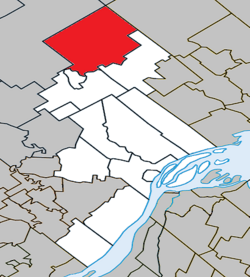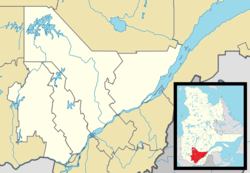Mandeville (French pronunciation: [mɑ̃dvil]) is a municipality in the D'Autray Regional County Municipality in the Lanaudière region of Quebec, Canada.
Mandeville | |
|---|---|
 Saint-Charles-de-Mandeville Church | |
| Motto: Tous ensemble en avant | |
 Location within D'Autray RCM. | |
| Coordinates: 46°22′N 73°21′W / 46.367°N 73.350°W[1] | |
| Country | |
| Province | |
| Region | Lanaudière |
| RCM | D'Autray |
| Settled | 1824 |
| Constituted | April 20, 1904 |
| Government | |
| • Mayor | Michael C. Turcot |
| • Federal riding | Berthier—Maskinongé |
| • Prov. riding | Berthier |
| Area | |
• Total | 339.30 km2 (131.00 sq mi) |
| • Land | 318.21 km2 (122.86 sq mi) |
| Population (2021)[3] | |
• Total | 2,363 |
| • Density | 7.4/km2 (19/sq mi) |
| • Pop 2016-2021 | |
| • Dwellings | 1,860 |
| Time zone | UTC−5 (EST) |
| • Summer (DST) | UTC−4 (EDT) |
| Postal code(s) | |
| Area code(s) | 450 and 579 |
| Highways | No major routes |
| Website | www |
History
editIn the early 19th century, the territory was part of the Hope Fief. This fief, with an area of 20,000 arpents (68.4 km2) was granted to Angélique Blondeau by Seignoral Lord Charles-Louis Tarieu de Lanaudière, but was mostly neglected by the seignoral lords. In 1824, one of the first settlers, Maximillien or Maxime Mandeville, arrived at the shores of the lake that today bears his name. And in 1837, further colonization occurred when a large group of settlers came from Maskinongé, Berthierville, and Sorel.[1][4]
In 1894, the Mission of Saint-Charles-de-Mandeville was formed and became a parish in 1903. The name is most likely a reference to Charles Turgeon, pastor of the nearby parish of Saint-Didace, who worked extensively in Mandeville. In 1904, the Municipality of Saint-Charles-de-Mandeville was established and in 1905, its post office opened.[1]
Since the toponym "Saint-Charles" had not been in common use for a long time, the municipality officially abbreviated its name to Mandeville in 2001.[1] Soon after, the municipal boundary between Mandeville and Saint-Damien was reorganized, and Mandeville gained about 146 square kilometres (56 sq mi).
Geography
editPrior to June 2, 2001, it was officially known as Saint-Charles-de-Mandeville.
The town itself is located along the Mastigouche River, just north of Lake Maskinongé. The municipal territory is dotted with lakes, many of which are lined with cottages. The northern portion is undeveloped and part of the Mastigouche Wildlife Reserve. Mandeville is considered a paradise for hunting and trapping (bear, moose, wolf, lynx) and fishing (musky, trout, bass).[1]...
Considering the means of a « Wildlife Reserve », this paragraph should not put up front that it is a «paradise for hunting and trapping» but instead, propose that Mandeville is «considered a paradise for various precious wildlife, such as bear, moose, wolf, lynx and, fish biodiversity such as musky, trout, bass.
Mandeville is home to the Pléïades Observatory, managed by Centre d'Observation et de Recherche Astronomique Mandeville (C.O.R.A.M. Inc.).
Demographics
editIn the 2021 Census of Population conducted by Statistics Canada, Mandeville had a population of 2,363 living in 1,242 of its 1,860 total private dwellings, a change of 7.9% from its 2016 population of 2,189. With a land area of 318.21 km2 (122.86 sq mi), it had a population density of 7.4/km2 (19.2/sq mi) in 2021.[5]
- Population in 2021: 2,363 (2016 to 2021 population change: 7.9%)
- Population in 2016: 2,189
- Population in 2011: 2,043
- Population in 2006: 2,221
- Population in 2001: 1,878
- Population in 1996: 1,824
- Population in 1991: 1,725
- Population in 1986: 1,541
- Population in 1981: 1,458
- Population in 1976: 1,243
- Population in 1971: 1,252
- Population in 1966: 1,228
- Population in 1961: 1,236
- Population in 1956: 1,266
- Population in 1951: 1,335
- Population in 1941: 1,256
- Population in 1931: 1,026
- Population in 1921: 1,172
- Population in 1911: 734
Private dwellings occupied by usual residents: 1,242 (total dwellings: 1,860)
Mother tongue:[7]
- English as first language: 1.9%
- French as first language: 96.2%
- English and French as first language: 0.8%
- Other as first language: 1.1%
Government
editThe mayors of Mandeville were:[8]
- Séraphin Baril 1905-1906
- Joseph Dulac 1907-1908
- Joseph Prescott 1908-1913, 1916-1924, 1926-1932
- Amédée Sylvestre 1914-1915
- Joseph Charpentier 1925-1926
- Henri Pontbriand 1933-1934
- Albert Charbonneau 1935-1947
- Alcide Desjardins 1948-1960, 1963-1970
- Alfred Prescott 1961-1962
- Roger Dupuis 1971
- Donat Savoie 1972-1978, 1981-1983
- Réal Bilodeau 1979-1980
- Jacques Prescott 1983-1995
- Roland Rocheleau 1995-1999
- François Benjamin 1999-2007
- Francine Bergeron 2007-2021
- Michael C. Turcot 2021-
Education
editThis section needs expansion. You can help by adding to it. (September 2017) |
Commission scolaire des Samares operates francophone public schools, including:
- École Youville[9]
The Sir Wilfrid Laurier School Board operates anglophone public schools, including:
- Joliette Elementary School in Saint-Charles-Borromée[10]
- Joliette High School in Joliette[11]
See also
editReferences
edit- ^ a b c d e "Mandeville (Municipalité)" (in French). Commission de toponymie du Québec. Retrieved 2009-11-23.
- ^ a b "Répertoire des municipalités: Geographic code 52095". www.mamh.gouv.qc.ca (in French). Ministère des Affaires municipales et de l'Habitation.
- ^ a b Statistics Canada 2021 Census - Mandeville census profile
- ^ a b "Historique" (in French). Municipalité de Mandeville. Retrieved 2009-11-23.
- ^ "Population and dwelling counts: Canada, provinces and territories, and census subdivisions (municipalities), Quebec". Statistics Canada. November 15, 2023. Retrieved July 10, 2024.
- ^ Statistics Canada: 1996, 2001, 2006, 2011, 2016, 2021 census
- ^ Statistics Canada 2021 Census - Mandeville community profile
- ^ "Nos maires" (in French). Municipalité de Mandeville. Retrieved 2009-11-23.
- ^ "Youville Archived 2017-09-23 at the Wayback Machine." Commission scolaire des Samares. Retrieved on September 23, 2017.
- ^ "JOLIETTE ELEMENTARY ZONE." Sir Wilfrid Laurier School Board. Retrieved on September 17, 2017.
- ^ "Joliette High School Zone Sec 1-5." Sir Wilfrid Laurier School Board. Retrieved on September 5, 2017.
External links
edit
